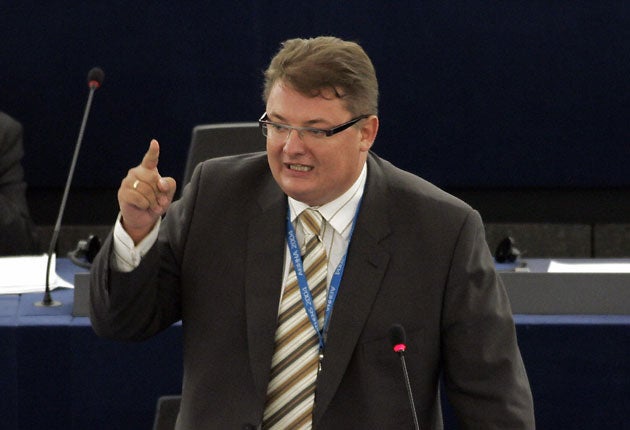With friends like these, will it end in tears?
Polish politician's photocall with Jewish Tories aimed at ending anti-Semite accusations

Your support helps us to tell the story
From reproductive rights to climate change to Big Tech, The Independent is on the ground when the story is developing. Whether it's investigating the financials of Elon Musk's pro-Trump PAC or producing our latest documentary, 'The A Word', which shines a light on the American women fighting for reproductive rights, we know how important it is to parse out the facts from the messaging.
At such a critical moment in US history, we need reporters on the ground. Your donation allows us to keep sending journalists to speak to both sides of the story.
The Independent is trusted by Americans across the entire political spectrum. And unlike many other quality news outlets, we choose not to lock Americans out of our reporting and analysis with paywalls. We believe quality journalism should be available to everyone, paid for by those who can afford it.
Your support makes all the difference.Next Tuesday evening, in a reception room at a Manchester hotel, the controversial Polish politician Michal Kaminski is expected to shake hands with members of Conservative Friends of Israel.
The image will be a gift to David Cameron, who is fighting a growing row over accusations concerning the anti-Semitic past of Mr Kaminski, the man who is now the Tory leader's greatest ally in Europe.
It will also be an attempt to rebuff Mr Kaminski's critics, who include the Foreign Secretary, David Miliband. This will be proof that he is not an anti-Semite, the Tories will say.
Last week, Mr Miliband attacked the Tories for aligning themselves with Mr Kaminski and a Latvian party accused of glorifying Nazism. In turn, William Hague, his Tory shadow, demanded an apology for the "slur".
However, the real story is more complex. Jewish leaders in Britain and Poland have expressed concern about Mr Kaminski's dubious past, particularly the active part he played in a campaign to oppose a Polish apology for a massacre of Jews during the Second World War.
Opponents and defenders of the politician are falling behind Labour and Tory party lines. The Jewish community is divided over the issue.
What is certain is that the increasingly bitter row has ensured that Europe, the graveyard of past Tory leaders, is set to overshadow what is supposed to be the conference at which Mr Cameron is anointed as prime-minister-in-waiting.
Margaret Thatcher was forced from power after losing the confidence of pro-Europeans in her cabinet; John Major was weakened by Maastricht rebellions and William Hague ran a disastrous 2001 election campaign on the basis of keeping the pound.
During his leadership, Mr Cameron has managed to avoid similar rows – but Europe is still toxic for the party.
In January, Mr Cameron appointed the Europhile Kenneth Clarke to the Shadow Cabinet – insisting that the old wounds over Europe had healed. Yet he and Mr Hague were already in talks with parties about the formation of a new European alliance, a development that has seen the Tories link up with parties which are anti-gay rights and accused of glorifying the Nazis.
Mr Cameron's alliance with Mr Kaminski's Polish Law and Justice (PiS) Party, the Latvian For Fatherland and Freedom Party and the Czech ODS Party was forged out of necessity. In 2005, when running for the leadership, he promised to leave the mainstream European People's Party of Angela Merkel and Nicolas Sarkozy in exchange for support from Eurosceptic Tory MPs whose votes were crucial in clinching his victory. Mr Kaminski is now the head of the new alliance, European Conservatives and Reformists.
But Mr Cameron has faced widespread alarm at revelations that the PiS has campaigned against gay rights, and that his Latvian allies participate in an annual event commemorating the Latvian Waffen SS. Most damaging is the revelation that Mr Kaminski of the PiS campaigned against an apology for Jedwabne, a horrific atrocity perpetrated in July 1941, when 1,600 Jews were rounded up and burnt alive.
When questioned about his role in the campaign earlier this year, Mr Kaminski at first denied taking part. He changed tack after it emerged from an interview with Nasza Polska, a Polish newspaper, that he had said Poland should apologise only if "someone from the Jewish side will apologise for what the Jews did during the Soviet occupation between 1939 and 1941".
Roberts Zile, of the For Fatherland and Freedom Party, will join Mr Kaminski at a fringe event on the EU in Manchester this week.
Last week, Mr Miliband criticised the Tory chairman, Eric Pickles, for suggesting that Latvians who joined the Waffen SS were only "conscripts" when in fact many were enthusiastic volunteers responsible for war crimes.
Join our commenting forum
Join thought-provoking conversations, follow other Independent readers and see their replies
Comments